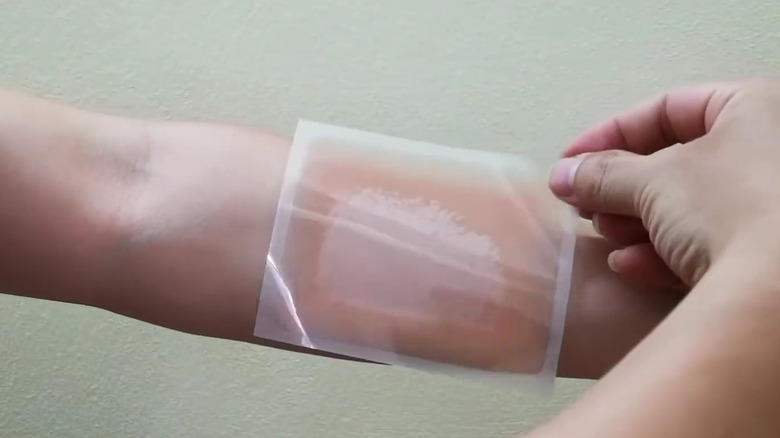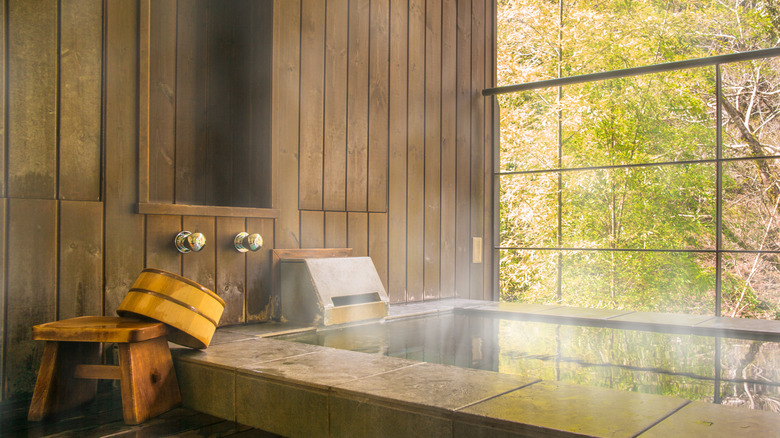The Destination In Japan Where Tourists With Tattoos Typically Aren't Allowed To Enter
Visiting an onsen can be the highlight of your trip to Japan. Not only is bathing in the warm water of a natural hot spring relaxing, but it is also a tradition that dates back thousands of years. If you hope to experience traditional Japanese culture in a way that is fun and potentially good for your body, an onsen is the perfect choice—but if you have tattoos, you might be banned from going inside.
While the perception of people with tattoos has gradually changed in Japan as more people get them, in general, they are still seen as taboo. This complicated relationship with ink has a long history in the country. Starting before 720 AD and not ending until the 1600s, many of those convicted of crimes were forcibly tattooed so that they could always be identified as a criminal. Later, these designs became associated with powerful Japanese criminal organizations. For many years, tattoos were illegal. While that's not the case today, the taboo remains.
In places like onsens, where you show a lot of bare skin, you might be allowed in even if you have tattoos, but you also might be turned away. If you want to relax in a steamy onsen in the mountains of Yudanaka or unwind in a bathhouse in the middle of bustling Tokyo, you might need to hide your ink.
Cover your tattoos to enter an onsen
Onsens are just one of the many fantastic destinations in Japan that won't break the bank, but if you have tattoos, you'll have to put in a little more effort to visit them. Fortunately, one cheap and easy option is to cover them up. That can be tricky since many onsens are for nude bathing, but there are products specifically made for this. You may be familiar with SecondSkin bandages from when you got your tattoo. While those are transparent, there are similar thin adhesive waterproof bandages called tattoo seals that you can buy, which will discreetly conceal your ink. You can buy these in advance, but big discount stores like Don Quijote sell them at reasonable prices if you're already in Japan.
Don't worry if it's not 100% hidden or the tattoo seal stands out against your skin tone. You don't have to fool anyone into thinking you've never had a tattoo; just try your best to cover them up. How seriously onsens take their tattoo bans varies, but some even sell tattoo seals themselves, so it's not like they don't know that people with tattoos are using them to get in.
Find onsens that permit tattoos or ask for permission to visit
If tattoo seals irritate your skin, or you don't feel like covering up your ink, you can try a few other methods to experience a Japanese onsen on your trip. One option is to rent a private onsen, where nobody will see your tattoos, but that can be expensive. You can also seek out an onsen that advertises itself as tattoo-friendly. With so many tourists coming to Japan and many younger people pushing the boundaries of Japan's tattoo taboos, onsens in large cities will cater to those with tattoos. That doesn't mean you won't have a traditional onsen experience. In fact, Dogo Onsen, one of the oldest bathhouses in Japan, allows visitors with tattoos.
If you visit one of Japan's gorgeous cities and can't find a convenient tattoo-friendly onsen, you can always ask for permission. Contact any onsen you are interested in visiting before you arrive, tell them about the tattoos you have, and respectfully ask if you can enter. If you're already at the onsen, the Japan National Tourism Organization recommends using the phrase, "Tatu no haitta gaikokujin desu ga, daijobu deshou ka?" which translates to "I'm just visiting Japan but I have a tattoo, am I OK to go inside?"


